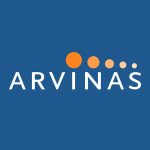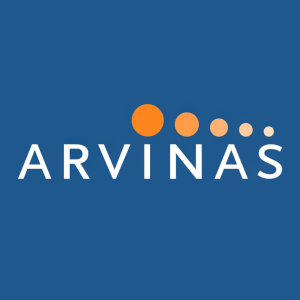Welcome to our dedicated page for Arvinas news (Ticker: ARVN), a resource for investors and traders seeking the latest updates and insights on Arvinas stock.
Arvinas, Inc. (ARVN) is a clinical-stage biopharmaceutical leader pioneering targeted protein degradation through its PROTAC® technology. This news hub provides investors and researchers with essential updates on therapeutic developments, strategic collaborations, and clinical milestones.
Access authoritative reporting on ARVN's oncology and neurodegenerative disease programs, including estrogen receptor degraders for breast cancer and novel neurological candidates. Our curated news collection features:
• Clinical trial developments
• Research collaborations
• Regulatory milestones
• Scientific presentations
Bookmark this page for real-time updates on ARVN's progress in addressing previously undruggable targets through innovative protein degradation approaches. Verify information directly through official company communications and SEC filings.
Arvinas (Nasdaq: ARVN) announced late‑breaking Phase 1 data for ARV-102, an oral brain‑penetrant PROTAC LRRK2 degrader, presented at MDS 2025 on Oct 5, 2025.
The PR states ARV-102 was generally well tolerated (single doses up to 200 mg; multiple daily doses up to 80 mg) with no discontinuations or SAEs. Plasma and CSF exposure increased dose‑dependently, indicating brain penetration. The PR reports >90% PBMC LRRK2 reductions at ≥20 mg and median PBMC reductions of 86% (50 mg) and 97% (200 mg) in patients. In healthy volunteers, 14 days of 80 mg produced CSF proteomic decreases in lysosomal and microglial pathway markers linked to Parkinson’s disease.
Arvinas (NASDAQ:ARVN) announced two upcoming presentations featuring clinical data for ARV-102, their investigational PROTAC degrader targeting LRRK2 for Parkinson's disease, at the 2025 International Congress of Parkinson's Disease and Movement Disorders® in Honolulu.
The presentations include a first-in-human study examining safety, pharmacokinetics, and pharmacodynamics of ARV-102 in healthy participants, and a late-breaker presentation on pathway engagement in both healthy volunteers and Parkinson's disease patients. The sessions are scheduled for October 7-8, 2025.
Arvinas (NASDAQ:ARVN) announced significant strategic changes, including plans to out-license vepdegestrant commercialization rights with Pfizer to a third party. The drug is under FDA review for ER+/HER2- advanced breast cancer with a PDUFA date of June 5, 2026.
The company unveiled major cost optimization measures, including a 15% workforce reduction and operational streamlining, expecting to achieve over $100 million in annual savings compared to FY 2024. The Board authorized a $100 million stock repurchase program and reaffirmed cash runway through H2 2028.
Arvinas continues advancing three Phase 1 PROTAC degraders: ARV-102 for Parkinson's disease, ARV-393 for non-Hodgkin lymphoma, and ARV-806 for solid tumors.
Arvinas (NASDAQ:ARVN), a clinical-stage biotech company focused on targeted protein degradation, has announced its participation in two upcoming investor conferences. Management will engage in fireside chats at the Wells Fargo Healthcare Conference on September 4 and the Cantor Global Healthcare Conference on September 5.
Live audio webcasts of both presentations will be accessible through the company's website under the "Events and Presentations" section of the Investors and Media page.
Arvinas (NASDAQ:ARVN) and Pfizer announced the FDA's acceptance of the New Drug Application (NDA) for vepdegestrant, a novel treatment for ESR1-mutated, ER+/HER2- advanced breast cancer. The FDA has set a PDUFA date of June 5, 2026.
The application is supported by the pivotal Phase 3 VERITAC-2 trial, which demonstrated significant improvement in progression-free survival compared to fulvestrant. Notably, vepdegestrant is the first PROteolysis TArgeting Chimera (PROTAC) to show clinical benefit in breast cancer patients. The trial results were presented at ASCO 2025 and published in The New England Journal of Medicine.
Arvinas (NASDAQ:ARVN) reported Q2 2025 financial results and significant pipeline developments. The company submitted a New Drug Application for vepdegestrant for ESR1m, ER+/HER2- advanced breast cancer treatment, marking the first-ever PROTAC degrader submission. The Phase 3 VERITAC-2 trial showed a 2.9-month PFS improvement versus fulvestrant in specific patient populations.
Financial highlights include $861.2 million in cash and equivalents as of June 30, 2025, with funding runway into 2H 2028. Q2 revenue was $22.4 million, down from $76.5 million year-over-year, while R&D expenses decreased to $68.6 million from $93.7 million. The company also announced CEO John Houston's planned retirement.
Pipeline progress includes positive ARV-102 Phase 1 data in Parkinson's disease, promising ARV-393 preclinical results, and initiation of the ARV-806 Phase 1 trial for KRAS G12D mutations.
Arvinas (NASDAQ:ARVN), a clinical-stage biotech company focused on targeted protein degradation, has scheduled its Q2 2025 financial results announcement and corporate update for August 6, 2025, at 8:00 a.m. ET. The presentation will be accessible via live webcast in the Events and Presentations section of the company's investor relations website.
A recording of the webcast will be made available on www.arvinas.com after the event concludes.
Arvinas (NASDAQ:ARVN), a clinical-stage biotech company focused on targeted protein degradation, announced that CEO and President John Houston, Ph.D. will retire from his executive roles following the appointment of a successor. Dr. Houston will continue serving as Chairperson of the Board of Directors.
During his 8-year tenure, Houston led Arvinas through significant achievements, including launching six programs into clinical trials, reporting the first positive pivotal Phase 3 trial for a PROTAC degrader, and demonstrating the first oral PROTAC's pharmacodynamic activity in the central nervous system. The Board of Directors has initiated a search for a new CEO to ensure continued leadership.


